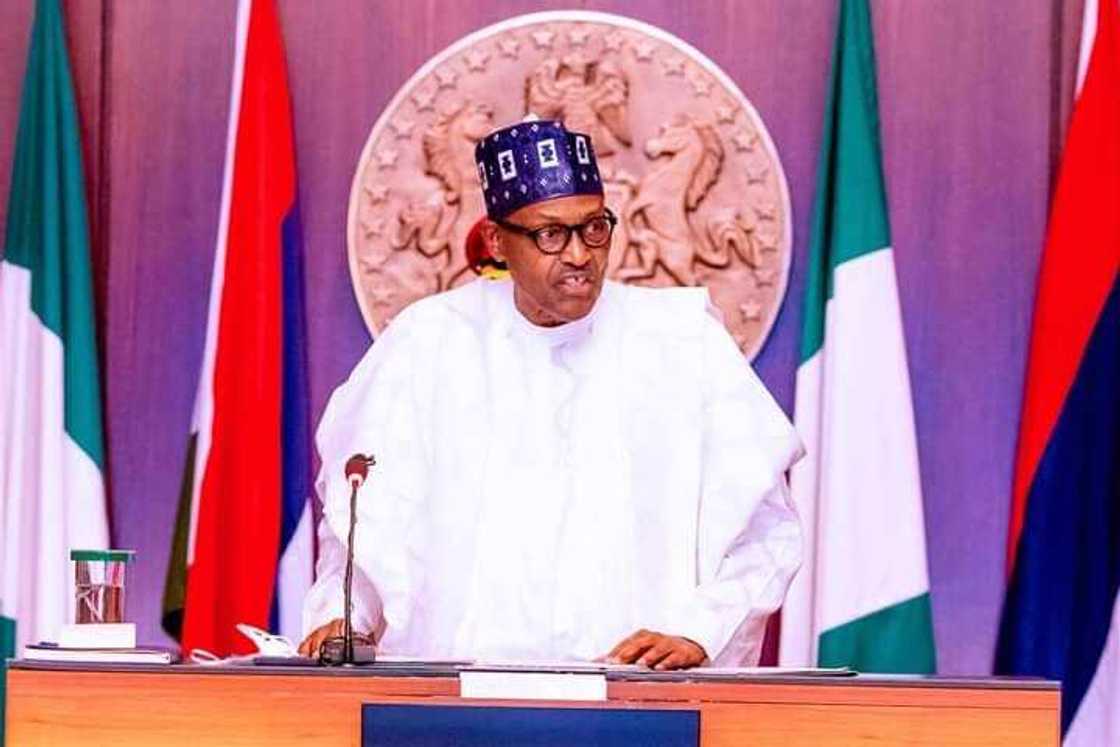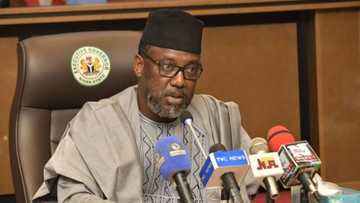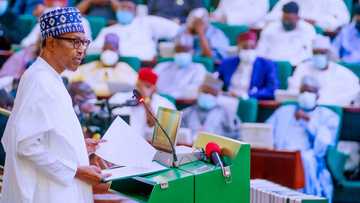FG Vs State Governors: Experts Reveal Who Should Collect VAT
- The legal battle between the federal government and the state governments over whose responsibility it is to collect VAT deepens and has continued to generate reactions
- In recent times, some governors are in support of the FIRS collection of VAT while others insist that VAT should be collected by the state governments
- This week, Legit.ng had a chat with a tax expert and lawyers, and they shared their opinion on who should collect VAT
The Value added Tax (VAT) is a consumption tax that has been embraced and adopted by many nations across the globe; it is difficult to avoid and relatively easy to administer.
Different countries operating a federal system of government have different structures of VAT.
Nigeria's VAT rate since the introduction through the VAT Decree No. 102 of 1993 constitution has been 5% up until January 2020, when it was increased to 7.5%.
The decision by the Federal Executive Council (FEC) to approve the proposed increase did not come as a surprise given the several attempts by recent and past administrations to increase the rate of VAT. The VAT rate of 7.5% took effect immediately after the Finance Act 2019 was signed into law by President Muhammadu Buhari on Monday day, January 13, 2020.

Source: Facebook
PAY ATTENTION: Join Legit.ng Telegram channel! Never miss important updates!
Meanwhile, VAT was introduced in Nigeria via Decree 102 of 1993 and implementation began in 1994. It replaced the sales tax introduced via Decree 7 of 1986.
Since introduction almost 3 decades ago, VAT has become the fastest growing tax revenue head in Nigeria.
The 1999 Constitution does not mention VAT, sales or consumption tax even though the VAT law predates the 1999 constitution. The omission means it is considered a residual item which falls within the remit of state to legislate on based on Section 4(7) of the 1999 Constitution.
The VAT act has been amended several times with key changes such as clear definition of exempt items.
In recent times, some state governments have opposed the collection of VAT by the federal government via the Federal Inland Revenue Service (FIRS). In fact, The FIRS and some state governments are currently in a legal battle over the collection of VAT.

Read also
Nigerian students to suffer more as university workers challenge FG, make fresh declaration over strike
Presently, Rivers and Lagos state governments had enacted laws and called for decentralization of VAT collection while some states want a centralized collection of VAT.
This week, Legit.ng sought the opinion of experts on who should be collecting VAT, the state government or the federal government?
A tax professional, Joshua Okon, said that no one can out rightly state who should collect VAT, considering the fact that all parties involved are waiting on the final judgment of the court on the issue, adding that the state should collaborate with the federal government and they should work together.
He said:
“Because the matter is in the court at the moment, no one can say specifically who to collect tax because we all awaits the court to deliver its judgment on the issue that is of heated debate in the country at the moment.
“But according to the 1999 constitution of the federal republic of Nigeria 1995, it says that the FIRS shall collect tax but didn’t make mention of VAT. The constitution did not specify VAT. But from inception, FIRS collect tax and if the Supreme Court deliver its judgment that the state should collect VAT, states can’t know all the clients to collect tax only the federal government has the data. So it would be better for states to collaborate with the federal government and work together for the collection of VAT.”

Read also
Who my successor will be - Buhari speaks to Nigerians in first tweet after lifting Twitter suspension
However, opposing his view, Barrister Martins Eke said the federal government should collect VAT, noting that the National Assembly can validly enact the VAT Act.
He affirmed thus:
“The question of who is to collect VAT is not as straightforward as most persons have alluded especially in the light of the Federal High Court’s judgment in Rivers State.
"Firstly, taxation as a subject is both in the exclusive legislative list and concurrent legislative list. The exclusive list contains matters exclusively preserved for federal legislation. That is the National Assembly. The concurrent legislative list contains matters for both federal and state legislation. With regard to taxation, the exclusive legislative list allows the National Assembly to make laws relating to stamp duties, income, profit and capital gains. The state also has similar power; however its power is limited to individuals or entities that are not necessarily companies. i.e. business names.
"Be that as it may, the controversy is tied to the fact that consumption tax is not expressly provided for in the constitution. Hence, the divergent opinion as to whom should not only enact but also collect. Now, matters not included in the constitution are deemed residual. Hence, both the state and the National Assembly can legislate on it. This is however subject to the provision of Section 4(5) of the Constitution which gives the National Assembly the prevailing right over the state on any concurrent matter.
"This explains why regardless of state overseeing income of individuals, the law authorizing such tax, that is Personal Income Tax Act is an Act of the National Assembly not a law of the House of Assembly. Accordingly, the VAT Act is a valid legislation of the National Assembly and it clearly states that it should be collected by the Federal Government via its collecting agent which is the Federal Inland Revenue Service. States have gone on to legislate several forms of consumption taxes and the Court has repeatedly held that the VAT Act being an Act of the National Assembly and by the provision of S.4(5) of the Constitution is the prevailing law on consumption tax.
"Suffice to say, that argument in favour of states has been hinged on states legislative powers over matters deemed residual. Firstly, consumption tax is not exactly residual. It is a supplemental matter connected to Item 58 of the exclusive legislative list and by virtue of Item 59 and 68 of the exclusive legislative list, it is well within the jurisdiction of the National Assembly.
"Be that as it may, there is nothing precluding National Assembly from legislating on matters deemed residual. There is no constitutional basis for that. Agreeably, judicial precedents have upheld the mistaken belief and hinged its reason to Section 4(7) of the Constitution. I have read it and I do not see the expression upon which these precedents were made.
"Without prejudice to the surrounding issues of VAT administration in Nigeria, I am of the position that the National Assembly can validly enact the VAT Act. Thus, the Federal Government is the right party to collect same in accordance with the VAT Act.”

Read also
N1.9bn debt: Your office will be in darkness until payment is made - AEDC tells Nigerian governor
Nevertheless, a tax expert identified simply as Olayinka Stephen opined that the collection of VAT should not be the subject matter rather the leakages in the system should be fixed.
According to him, the FIRS has all it takes to collect VAT and are making good use of that position but the major issue should be the establishment of a new policy on how VAT should be collected and shared.
Stephen affirmed thus:
“Clearly, the taxies and levies Act is the designated Act which gives effect to who should collect tax. The power to designate such functions lies with the National Assembly.
“In my opinion, from the turnover of revenue generated from VAT in Nigeria, the FIRS has made significant progress in Tax Administration and collection of VAT. The states are clearly not equipped and do not posses’ significant techniques in administering and collecting VAT.
“The major issue around this whole VAT drama should be establishing a new policy around how the revenue collected should be shared. Following, section 40 of the VAT Act requires that the VAT collected in a year be shared 15% to the Federal Government, 50% to the State and 35% to the Local government. Technically, the State takes 85% of the VAT collected and that is good for fiscal federalism. I strongly agree that adjustment be made to give states with high VAT returns more consideration than others.

Read also
Over 100 million Nigerians don’t pay tax, government laments low tax income, begs Nigerians
“There are too many inefficiencies and leakages in the system. We need to fix this instead of confusing taxpayers on who collects VAT.”
Liborous Oshoma, a human rights activist and a lawyer also argued that the federal government constitutionally has no power to collect VAT.
He said:
“First and foremost, when you look at the entire gamut of the 1999 constitution, VAT was nowhere mentioned. It was a consumption tax that is usually collected by states and even when it was converted to VAT, via a decree in 1993, it was still collected at the state. And so because of the problem associated with the collection, so most of the institutions make recommendations to the federal government via the FIRS.
Proffering a solution, he said:
“The solution would be that all parties should sit on a roundtable and find an amicable resolution to it; it shouldn’t be a show of power. But constitutionally, the federal government has no power to collect VAT.”
Presidency reveals President Buhari’s final decision on VAT controversy
Meanwhile, Legit.ng had earlier reported that the Nigerian presidency has said that President Muhammadu Buhari will respect the final verdict on the issue of Value Added Tax (VAT) as decided by the Supreme Court.
The presidential spokesman, Femi Adesina, made the disclosure while speaking during an interview on Arise TV.
Adesina noted that though the case may drag up to the Supreme Court, the Nigerian leader would respect the rule of law.
VAT: Wike threatens showdown with FIRS
Earlier, Governor Nyesom Wike of Rivers state threatened to “take over” all offices of the Federal Inland Revenue Service (FIRS) in the oil-rich south-south state if the government agency continues with its “bullying.”
The governor spoke at a stakeholders’ meeting in Port Harcourt, the state capital while addressing business owners in the state.
Legit.ng gathered that Wike told the oil firms, construction companies and other business owners operating in the state to start remitting their Value Added Tax (VAT) to the state government starting from September.
Source: Legit.ng





